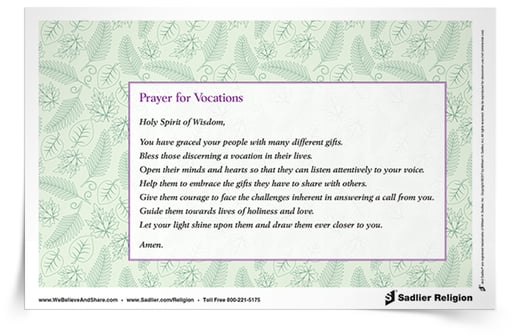September 14, 2022
In this article, we sat down with Dr. Matthew Halbach, Sadlier’s Executive Director of Catechesis, to learn more about his role as a deacon. Matt earned his PhD in Catechetics from The Catholic University of America in 2014 and was ordained in 2018 for the Diocese of Des Moines, IA. Matt is known as the Deacon Doctor, and plays many roles professionally and in the Church. Deacon Matt was a major contributor to Sadlier’s newest catechetical program, Christ In Us, and is also a national author and speaker. Learn more about Deacon Matt’s experience through the answers he shared with us.

Q: What is a deacon?
A: A deacon is one who is ordained to be as Christ the Servant in the parish community and in the wider community. A deacon’s ministry is focused on preaching the Good News and performing charitable works, particularly among poor and marginalized persons and groups.
Q: What are the requirements of being a deacon?
A: An applicant must be a baptized and confirmed male–at least age 35 at the time of his application–who has been Catholic for at least five years and is in good standing. Formation programs range from 4–7 years, depending on the requirements of the individual diocese. Programs place a strong emphasis on theological formation while also attending to the need to form the whole person.
Q: When and in what ways did you feel called to be a deacon?
A: My father-in-law, Joe, was preparing to be a deacon when I started dating my wife, Stacy. He and I had many conversations about the formation process and how being a deacon would positively impact his family and marriage. Joe’s influence led me to begin discerning the diaconate. That discernment process would eventually include Stacy and our children. We all came to believe this was something God wanted us to do. Family support is critical for navigating formation and for being a healthy and happy deacon.
Q: How did you become a deacon?
A: Currently, our diocese requires 4.5 years of formation, most of which takes place on the weekends. You are evaluated throughout the process, checking not only for competency but also to see if being a deacon is still something the candidate feels called to pursue. At the end of formation, the local bishop ordains you. The ordination is an incredibly beautiful liturgy!
Q: How do you serve your parish as a deacon? What are some of the things that you do?
A: Liturgically speaking, deacons preach, baptize, marry, and do funerals. They also have a ministry in the parish. Currently, I am the RCIA coordinator, so I help people discern a call to become Catholic. Many deacons will have an additional ministry outside of the parish. Mine happens to be writing and speaking about the Catholic faith—what you might call evangelization.
Q: What is one of your favorite things about being a deacon?
A: I enjoy meeting people and getting involved in their lives in a way that leads them deeper into their faith and, consequently, closer to God. I am also blessed by the people I am ordained to serve. My experience of ministry has truly been reciprocal.
Q: What would you say to someone who feels called to the consecrated or religious life?
A: I would encourage that person to continue to pray, and to talk with those who are already living as religious or consecrated persons. You can download a Prayer for Vocations Prayer Card to pray for all those who are discerning a vocation, whether to the priesthood, religious, married, or single life, or a commitment to a particular ministry.
Q: How can we learn more about deacons?
A: Check out your local diocesan vocation page for more information about applying to be a deacon. As for general information on the diaconate, check out James Keating’s The Heart of the Diaconate.
Also, check out my podcast, CHATechesis, to catch up with some deacons who are doing positive and impactful things around the country.
You might also want to check out Sadlier’s Postcards from Vatican City feature, which includes a postcard all about a seminarian’s diaconate ordination in Rome as part of the journey of becoming a priest.
Conclusion
Deacons play an important role serving in parishes and in the Church through ministry focused on preaching the Good News and performing charitable works.
Follow Along with Deacon Matt
Deacon Matt hosts a weekly podcast series, CHATechesis, that interviews priests and deacons around the country who are finding creative and fresh ways to share the gospel message and promote missionary discipleship.
You can also find Deacon Matt live on Sadlier’s weekly Catechist Stream, a livestream that is designed for catechists and dedicated to addressing current issues, events, and strategies in catechesis.



